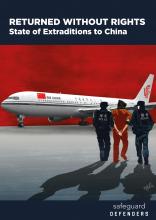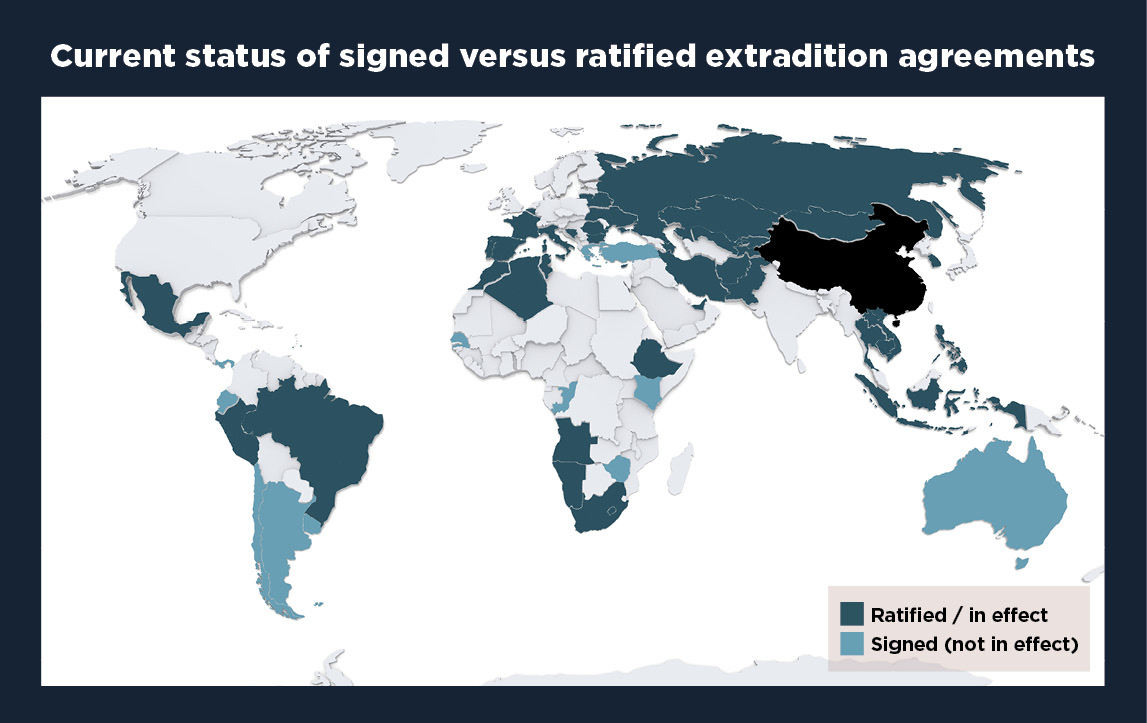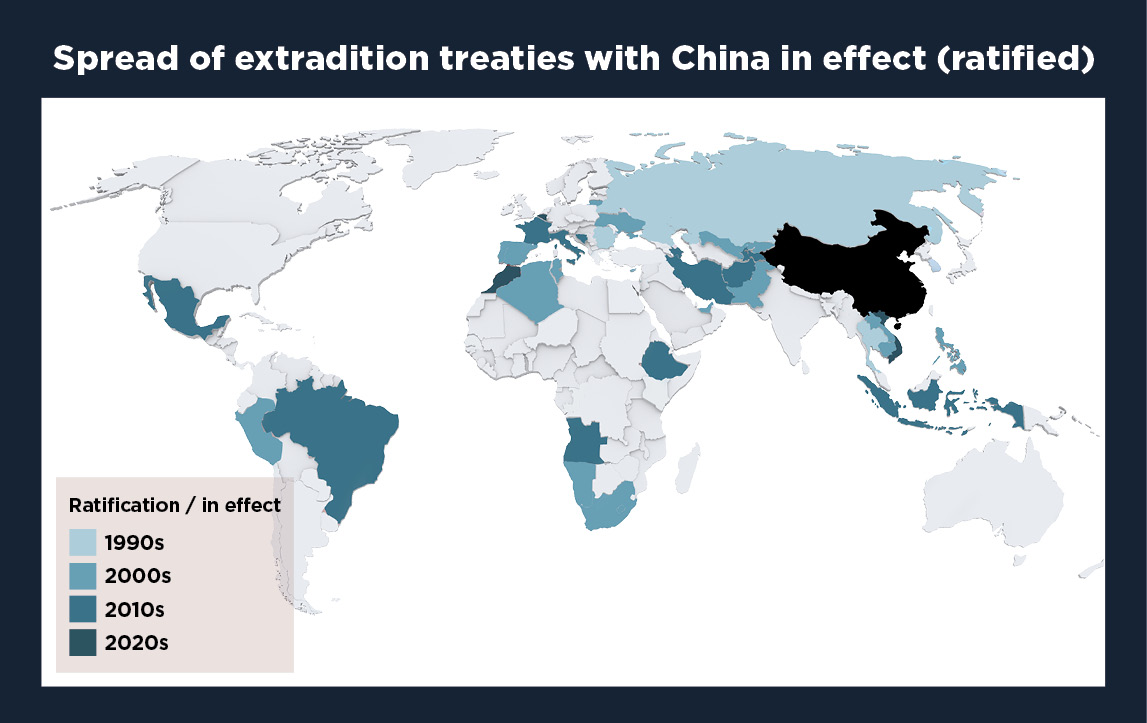Hide and Seek - major report on China's extradition campaign
Safeguard Defenders launches a new series of resources to assist practitioners and rights defenders around the world to counter extraditions to China.
 The series launches with the release of Hide and Seek: China’s Extradition Problem - a manual on countering extradition to China, the first of its kind dedicated guide on confronting extraditions to China; a stand-alone report Returned Without Rights: State of Extraditions to China, which draws from the full report; and an advocacy pamphlet for lawmakers and other international stakeholders.
The series launches with the release of Hide and Seek: China’s Extradition Problem - a manual on countering extradition to China, the first of its kind dedicated guide on confronting extraditions to China; a stand-alone report Returned Without Rights: State of Extraditions to China, which draws from the full report; and an advocacy pamphlet for lawmakers and other international stakeholders.
With the release of this new series, Safeguard Defenders launches a dedicated resource center for information related to extraditions to China. Extradition defense lawyers, lawmakers, journalists, and legal academics should check back often as new investigations, resources and other materials will be regularly updated.
 Download the manual as an interactive PDF: Hide and Seek: China’s Extradition Problem or the briefer report Returned Without Rights: State of Extraditions to China, along with the related report Involuntary Returns: China’s covert operations to force ‘fugitives’ overseas back home. The two-page extradition factsheet is also available for download here. For other issues related to the expansion and abuse of extradition agreements, and broader extrajudicial involuntary returns, visit Safeguard Defenders’ publications section.
Download the manual as an interactive PDF: Hide and Seek: China’s Extradition Problem or the briefer report Returned Without Rights: State of Extraditions to China, along with the related report Involuntary Returns: China’s covert operations to force ‘fugitives’ overseas back home. The two-page extradition factsheet is also available for download here. For other issues related to the expansion and abuse of extradition agreements, and broader extrajudicial involuntary returns, visit Safeguard Defenders’ publications section.
When Thailand concluded an extradition treaty with China and extradited Wang Jianye (王建业), China proceeded to execute him despite having made assurances that they would not seek capital punishment. When China gave Canada diplomatic assurances in order to secure the extradition of Yang Fong (杨峰), including assurances that the 35-year old’s rights would be respected, Yang was promptly executed without explanation. Not all extraditions end in such tragedy nor are all of China’s frequent violations of diplomatic assurances and bilateral treaties as extreme, but one way or another China’s violations of international norms are constant.
China’s Extradition Problem

MAP: Status of extradition agreements with China, signed versus ratified
China’s efforts to expand its judicial and law enforcement operations extraterritorially, such as through extradition treaties and agreements, is a direct threat to international human rights, fundamental freedoms, and democratic institutions everywhere. China’s manipulation of extradition agreements to grow and exert its global influence has not come out of the blue. It is a full part of a wider set of transnational repression tools including involuntary returns. In fact, many extradition cases often begin with China’s efforts to seek returns via non-legal means, thereby directly tainting any pretense of legality in extradition proceedings.
Sending any person back to China against their will is a clear breach of the fundamental international norm of non-refoulement, which dictates that nobody should be transferred to a country where they are at risk of persecution and gross human rights abuses.
International norms establish very clear grounds for the automatic rejection of extraditions. In part, when these involve political offenses, or where there are well-founded concerns over torture, denial of a fair trial, and risk of persecution based on race, religion, ethnicity, or political opinion. A common, yet questionable practice, is to accept diplomatic assurances that the individual facing extradition will be treated fairly and free of persecution. Safeguard Defenders has assessed China along each one of these standards to reveal an abhorrent record of abuse and violations.
Torture and other cruel, inhuman or degrading treatment or punishment
While China is a State-Party to the Convention Against Torture (CAT), it has wholly failed to adhere to its obligations. Torture is - as noted by various UN organs, international governmental reports, and in high court verdicts denying extraditions - of particular concern in China’s systems for custody before formal arrest, such as in the greatly expanding use of Residential Surveillance at a Designated Location (RSDL), and in the Liuzhi system run by China’s (non-judicial body) the National Supervision Commission (NSC). The latter is used for investigations into corruption and economic crimes of State functionaries, Party members, and State-owned companies. The NSC is also the leading Party organ behind China’s expanding extraditions and international judicial cooperation, despite domestic laws not legally empowering it to do so.
While the risk of torture in China is well documented, the fact that one of the core party institutions responsible for perpetrating torture and enforced disappearances is also the leading body behind most of China’s international extradition work underscores the inherent severity of China’s extradition problem.
Right to a Fair Trial
“The Communist Party of China's absolute leadership over political and legal systems must be upheld” and the “legal system should uphold the Party's absolute leadership.”- Xi Jinping, 2018
The right to a fair trial includes such fundamental safeguards as the right to present in court, to not be subjected to trial in absentia, to be allowed to have a lawyer of one’s choosing, to be tried in public, by an independent and impartial court, and to be presumed innocent until proven guilty. In China, international fair trial rights are simply non-existent. There is no such thing as an independent and impartial court as both prosecutors and courts are controlled by an organ of the Chinese Communist Party (the Political and Legal Affairs Commission). The legal system is subservient to party leadership. And the very limited procedural safeguards that do exist on paper, including the ability to access a lawyer of one’s choosing, have been stripped away in recent years as documented by Safeguard Defenders' three-part report series Access Denied; China's Vanishing Suspects (disappearing detainees inside detention centers), China's False Freedom (disappearing prisoners upon their formal release), and China's Legal Blockade (illegal blocking of access to legal counsel before trial).
Under international norms, this structural inaccessibility to a fair trial should necessitate the automatic rejection of any extradition agreement. China has sought to evade such grounds for rejection by making diplomatic assurances, another area where manipulation and violation of norms prevails.
Broken Diplomatic assurances and violation of treaties
Diplomatic Assurances are guarantees from the requesting State to the sending State that the target of extradition will be afforded human rights protections by both parties. As a result of their function, diplomatic assurances are mostly only ever sought where there is already serious concern of abuse. In 2017, the UN Committee Against Torture stated: “The Committee considers that diplomatic assurances from a State party to the Convention to which a person is to be deported should not be used as a loophole.”

MAP: Spread of ratified extradition agreements with China 1990s to present
The reality of human rights abuse in China is rampant enough that in pursuing extraditions it must issue diplomatic assurances to appease the hosting country that compliance won’t violate their international commitments. But for diplomatic assurances to work, they must be made in good faith. China has demonstrated at every opportunity that it does not issue assurances in good faith. This is true as noted in the examples above regarding assurances of fair treatment resulting instead on the death penalty, as well as in China’s wanton breach of consular agreements and denial of access to detained foreign nationals.
On account of China’s rampant and repeated violation of diplomatic assurances and related bilateral agreements, backed up by the widespread and systematic presence of torture and the denial of fundamental fair trial rights, all automatic grounds for rejection of extradition, Safeguard Defenders concludes:
- No country should enter into or maintain extradition agreements with China, and concrete steps should be taken to issue an immediate global moratorium on any extradition requests.
- States with mutual legal assistance treaties with China should further consider suspending bi- and multi-lateral law enforcement coordination.
- International multilateral institutions with a mandate on law enforcement coordination should conduct a thorough due diligence assessment on the human rights implications of China’s membership or any such partnerships.
Read the full manual as PDF, Hide and Seek: China’s Extradition Problem, a manual on countering extradition to China; the summary report, Returned Without Rights: State of Extraditions to China, or access the two-page factsheet here, or visit the publications section for more reports.
Check back regularly for updates on a brand new resource center on all things extraditions coming soon.